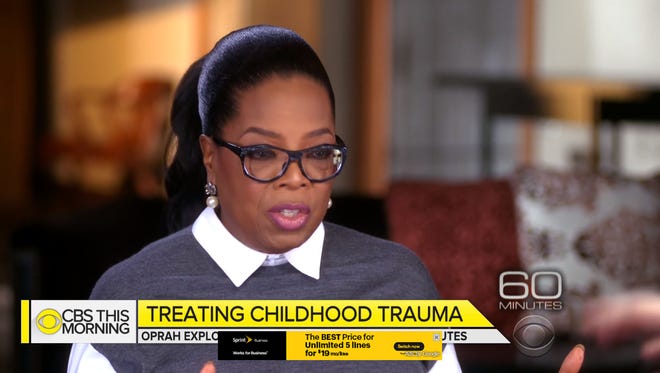Oprah Winfrey reports from Milwaukee on trauma, citing Journal Sentinel series
Inspired by a series of stories last year in the Journal Sentinel, Oprah Winfrey devoted a report on "a 21st-century epidemic of childhood trauma," broadcast Sunday night on the CBS show "60 Minutes."

Reporting for the segment was largely done in Milwaukee.
THE SERIES: An epidemic of childhood trauma haunts Milwaukee
"The story was life-changing for me," Winfrey said in a separate CBS interview ahead of the Sunday night broadcast. "Of all the stories I’ve ever done in my life, and all the experiences I’ve ever had, and the people I’ve interviewed, this story has had more impact on me than practically anything I’ve ever done.”
Quoting data from the U.S. Centers for Disease Control and Prevention, Winfrey said: “One out of every eight children suffers enough trauma to cause lasting damage.”
VIDEO: How economic decline and neurological trauma create a self-reinforcing downward dynamic
RELATED: Oprah on 60 Minutes: Childhood trauma in Milwaukee will be focus
RELATED: Alan Borsuk: Oprah could get another good idea in Milwaukee
Winfrey interviews many of the same subjects featured in the five-part series, “A Time to Heal.” The Journal Sentinel documented how non-military trauma, invisible in statistics until 10 years ago, has locked Milwaukee and other cities into a downward spiral of unemployment, domestic violence, poverty, drug abuse, depression, suicide and mental illness.
Winfrey's piece begins with Alisha Fox, a young woman who was sexually abused by her father beginning when she was 4 years old. “I got diagnosed with post-traumatic stress disorder when I was 15,” Fox tells Winfrey. It quotes one of her social workers at the SaintA child welfare agency, saying Fox at one point was "acutely suicidal."
As in "A Time to Heal," Fox is presented as an exemplar of human resilience — the ability to bend but not break in the aftermath of adversity. “At the end of the day, I think that I'm a survivor,” Fox tells Winfrey.
"60 Minutes" also visits a transitional housing facility for homeless women and their children. Nia Imani Family Inc., on the city's north side, has pioneered healing and recovery practices for its residents.
Winfrey's report describes the world's most commonly used metric of civilian trauma, called the adverse childhood experiences survey, or the ACE test. The test consists of 10 blunt questions asking how much violence, abuse, neglect, drug use or incarceration a person experienced in their homes growing up.
“A high score on the ACE test is a powerful predictor of physical and mental problems down the road," Winfrey explains. Fox's score is 9 out of 10.
Just asking the ACE questions shifts the debate for those who are struggling. “What has been life-changing for me is the question, 'What happened to you?' not 'What is wrong with you?'” Winfrey said.
RELATED: MU's Mike Lovell takes reins in addressing trauma in Milwaukee
RELATED: Childhood trauma, and its consequences, reach deep into rural Wisconsin
RELATED:Milwaukee has been caught in a relentless social and economic spiral
The Journal Sentinel’s report is what prompted Winfrey’s interest in trauma and resilience in Milwaukee, said her producer at CBS, Rome Hartman.
Speaking Tuesday on "CBS This Morning," Winfrey emphasized that society's conventional make-work jobs programs and job-training schemes "are working on the wrong thing" because they're oblivious to invisible neurological impairments. The Journal Sentinel reported that a half-century of anti-poverty and jobs programs never stopped the downward spiral in a high-trauma city.
CBS VIDEO: Oprah Winfrey reports on childhood trauma
What was new in the "60 Minutes" report was a series of confessional reflections by Winfrey.
"It's not lost on me the irony of being back in the same city, Milwaukee, where I grew up on welfare, poor, a lot of negative experiences, sexual abuse and all of that," she said in the "60 Minutes" segment.
That so many carry invisible scars came as a new insight to Winfrey. “It has definitively changed the way I see people in the world, and it has definitively changed the way I will now be operating my school in South Africa and going forward any philanthropic efforts that I'm engaged in," Winfrey told "CBS This Morning."
She elaborated further in the online video, released by CBS last week ahead of the "60 Minutes" report:
“I learned a lot on this story. The story was life-changing for me," Winfrey said. “It is my hope that our story on trauma-informed care will not just be impactful but will also be revolutionary. It certainly has caused a revolution in my own life.”